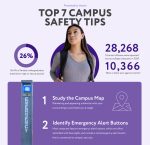
If you’re a parent sending your child off to college for the first time this fall, your mind is likely plagued with many concerns—among them being your child’s safety. Leaving the protection of parents, home and a community of familiar faces can be overwhelming for both you and them.
In addition to parents, female college students in particular often have safety concerns. They walk home from classes or the library at night with dimly-light pathways guiding them back to their dorm. They might find themselves in a social situation with someone who makes them uncomfortable, and unfortunately, they might even know someone who experienced on-campus violence.
In 2020, 28,268 criminal offenses were reported across 10,882 U.S. college campuses. Of those offenses, 10,366 were violent acts against women including rape, fondling, aggravated assault, murder and burglary. The U.S. Department of Education’s Campus Safety & Security website tracks campus crime and allows the public to see crime statistics for specific colleges and universities.
Before venturing off to college, and with those stats in mind, take some time to plan for safety precautions. While the hope is that a scary situation is never encountered, having some firm safety strategies will provide peace of mind.
- Study the Campus Map
Take the time to sit with a map of the campus and understand where everything is, including the distance between academic buildings and dorms or parking lots if commuting. Identify exactly where your classes are located to avoid wandering and appearing unfamiliar with your surroundings. - Identify On-Campus Emergency Alert Buttons
Most campuses feature several emergency alert buttons, which are often identified with blue lights and include a red emergency alert button. That button is connected to campus security, who will be able to identify the location. These have proven to be helpful in situations where dialing a cell phone isn’t possible, due to fleeing without your possessions or if you don’t have time to unlock your phone and dial.
- Safety in Numbers
Understand the importance of walking across campus or going to social events with a group instead of solo. At the very least, use the buddy system. Attackers are far less likely to commit an act of violence when they’re outnumbered. If you’re out with a group of friends and you want to head back to the dorms earlier than the rest, always leave with someone you trust. - Carry a Personal Safety Device
There are going to be moments when you have no choice but to walk alone on campus. In those instances, a personal safety device is critical. Arm yourself with Hootie™, which easily attaches to your backpack, water bottle or keychain for quick access, and when activated sets off a deafening 130-decible alarm and bright strobe light. The noise and light will send an attacker running and summon help quickly. - Be Smart with Social Media
Social media can be both a blessing and a curse. While it can chronicle your college experience and store lasting memories, it can also serve as a call-out for where you are and what you’re doing. One simple social media post about your late night of studying in the library is also a newsflash to a potential attacker that you’ll soon be making your way across campus—alone and in the dark. Also, be sure to turn off location services for social accounts sharing that data publicly in real-time, such as Snapchat. - Research Campus Safety Escort Services
Many colleges offer personal safety escort services when one or two students need to make their way around campus between dusk and dawn. Escorts operate under Campus Security and can be summoned at a moment’s notice or scheduled for recurring escorts. Research the availability of this service on your college campus and store the phone number in your cell phone in case you find yourself feeling uneasy. - Communicate Your Plans
Before venturing out, always tell a friend or roommate where you’re going and when you expect to return. Or, text a parent or other family member with your plans and destination, and text them again when you’ve returned safely. With a friend or loved one knowing your whereabouts and timeline, they’ll be on high alert if you don’t stick to your intended plans.
With a safety plan established, a young adult can attend college with peace of mind and focus on their studies and living the best years of their lives. Although these safety tips are specific to college campuses, many of them should become common practice even after graduation, such as carrying a personal safety alarm and being smart with social media.

